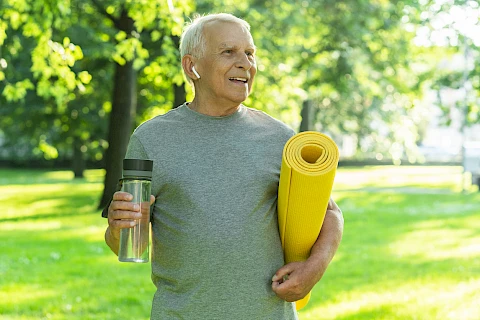
Arthritis commonly affects many seniors, causing joint pain and stiffness. This condition significantly impacts their daily lives, making simple tasks challenging. Caregivers may find managing arthritic stiffness in seniors challenging, as it requires balancing their comfort while encouraging activities that reduce pain.
Lifestyle changes are important in managing arthritis. These adjustments can make a big difference in reducing pain and improving mobility. Here are some lifestyle changes that can help relieve arthritic stiffness and how caregivers can assist in making these changes more manageable for seniors.
Reducing Joint Inflammation and Arthritic Stiffness in Seniors
Consider the suggestions below for effective arthritis management:
Regular Exercise
Regular exercise is essential for maintaining joint flexibility. Low-impact activities, such as walking, swimming, and yoga help keep joints moving without putting too much strain on them.
Caregivers should encourage seniors to start slowly and gradually increase their activity levels. Joining them for short walks or helping set up a simple yoga routine can make the experience more enjoyable. Remember to always check with their doctor before letting them start a new exercise routine.
Healthy Diet
A healthy diet helps in reducing inflammation and relieving arthritic stiffness in seniors. Include foods rich in omega-3 fatty acids like fish, nuts, and seeds, and add more fruits and vegetables, especially those high in antioxidants.
Caregivers can plan meals that include these anti-inflammatory foods. Cooking together also provides a fun activity and ensures seniors get the necessary nutrients.
Weight Management
Extra weight increases the pressure on joints, worsening arthritis symptoms. Caregivers can help seniors make healthier food choices and create a balanced meal plan. They can engage in regular physical activities with seniors to manage weight effectively. Seniors can also consult a dietitian if needed for personalized advice.
Proper Hydration
Hydration helps keep seniors' joints lubricated, reducing arthritic stiffness. Caregivers should ensure seniors drink enough water throughout the day by keeping a water bottle handy and encouraging small sips regularly. Infusing water with fruits can also make hydration more appealing.
Adequate Rest and Sleep
Getting enough rest is also important for managing arthritis symptoms. Proper sleep helps the body repair and reduces inflammation. Caregivers can create a comfortable sleep environment with supportive pillows and a good mattress. Establish a regular sleep schedule and encourage relaxing activities before bed, such as reading books or listening to calming music.
Stress Management
Stress may worsen arthritis symptoms, and high levels can increase pain and stiffness. Caregivers can help seniors engage in stress-reducing activities like meditation, deep breathing exercises, or hobbies they enjoy. They can also encourage regular social interactions to keep their spirits up.
Use of Assistive Devices
Finally, assistive devices help reduce strain on seniors' joints and relieve arthritic stiffness. Devices like canes, walkers, and ergonomic tools can make daily tasks easier. Caregivers should introduce these devices gradually and ensure seniors feel comfortable using them. Demonstrate how to use them properly and encourage regular use to make daily activities less stressful.
Let Senior Helpers Care for Your Loved Ones
Lifestyle changes play an important role in managing arthritic stiffness in seniors. Your loved ones can experience improved mobility and comfort by following the above tips and incorporating them into their daily routines.
Caregivers are vital in implementing these changes and supporting seniors' journey to better health. Encourage these lifestyle adjustments, and contact us at Senior Helpers The Wasatch Mountain for professional caregiving support in Ogden, Park City, Farmington, Syracuse, and Morgan.